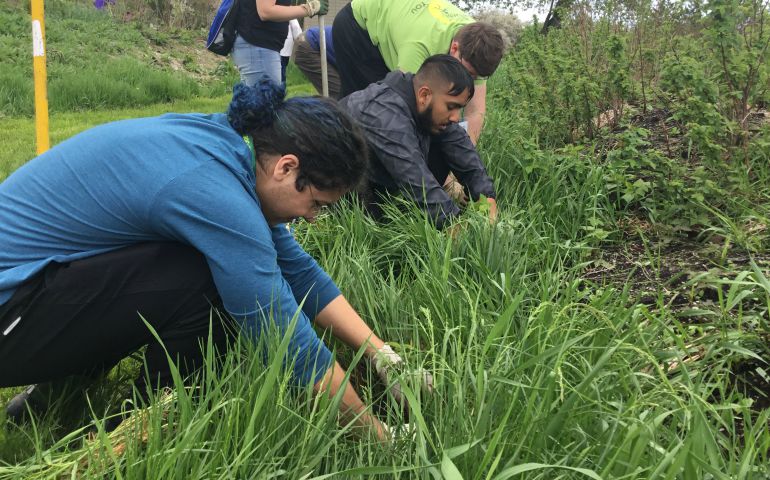
Young people plant food crops on a Hugelmound in the permaculture site on the campus of the Adrian Dominican Sisters' community. (Courtesy of Adrian Dominican Sisters)
Has the church left young people? Do youth have enough adult leadership? Are we listening to their wisdom? Is the church truly home? Do they feel responsible and valued? These were all questions the panelists raised this month in their responses to the following question:
We read that teens and young adults are "leaving the Catholic Church." Choose one aspect to discuss: What would you have liked to say to the bishops attending last month's youth synod? Are there ways we can learn from Catholic youth experiences and communicate with them? What is your community doing?
______

Lilian Bong is a Sister of St. Joseph of the Apparition in Western Australia. Born in Malaysia and trained as a nurse, she did medical mission outreach in Myanmar before making her final profession in 2016. Now she serves as second councilor to the provincial, does vocation and mission appeal work, and has a special ministry to elderly Chinese people.
Let me share two examples of how Catholics perceive the younger generation. The first was at our recent provincial chapter. We had engaged a prominent Catholic lawyer, one of the board of directors for Catholic Health Australia, to speak about the upcoming 2020 Plenary Council of the Australian bishops.
When she spoke on young people and church, the first thing she expressed was disappointment that the younger generation is no longer interested in going to church. I asked her whether she was aware that the archdiocese and the Catholic Youth Ministry (CYM) hold an annual Veritas Festival for young Catholics (with catechesis, live band and music, games, vocation stalls) at different Catholic schools and universities. More than eight hundred young people attended this event. She "wasn't aware of this at all."
The second example is from a seminar about the Plenary Council. We gathered into groups for sharing on the topic of young people in the Catholic church, and a priest began with the same remark that young people are no longer interested in attending church. I asked the same question as before. He was not aware that young Christians came to such events.
Do some tend to generalize that the younger generation is no longer interested in faith or spiritual encounters?
This year I presented on two separate occasions to educators and young people on the theme: "Open New Horizons for Spreading Joy: On Young People, Faith and Vocational Discernment."
At that gathering of families, school personnel, parish and religious communities, I asked them to reflect upon four main areas: discernment; accompaniment (we are called to walk with young people on their faith journey, starting from where they are rather than where we think they should be); listening (actively listen to our young people and as listeners, to be ready to change our hearts so as to be ready to listen even when we are challenged by what we hear); creating (a safe, welcoming environment thus making an inviting space for young people).
In Amoris Laetitia, Pope Francis mentioned that education in the faith has to adapt to each child, since older resources and recipes do not always work. Children need symbols, actions and stories. Adolescents usually have issues with authority and rules, so they need attractive testimonies that win them over by their sheer beauty. And it is essential that children actually see that prayer is something truly important for their parents.




